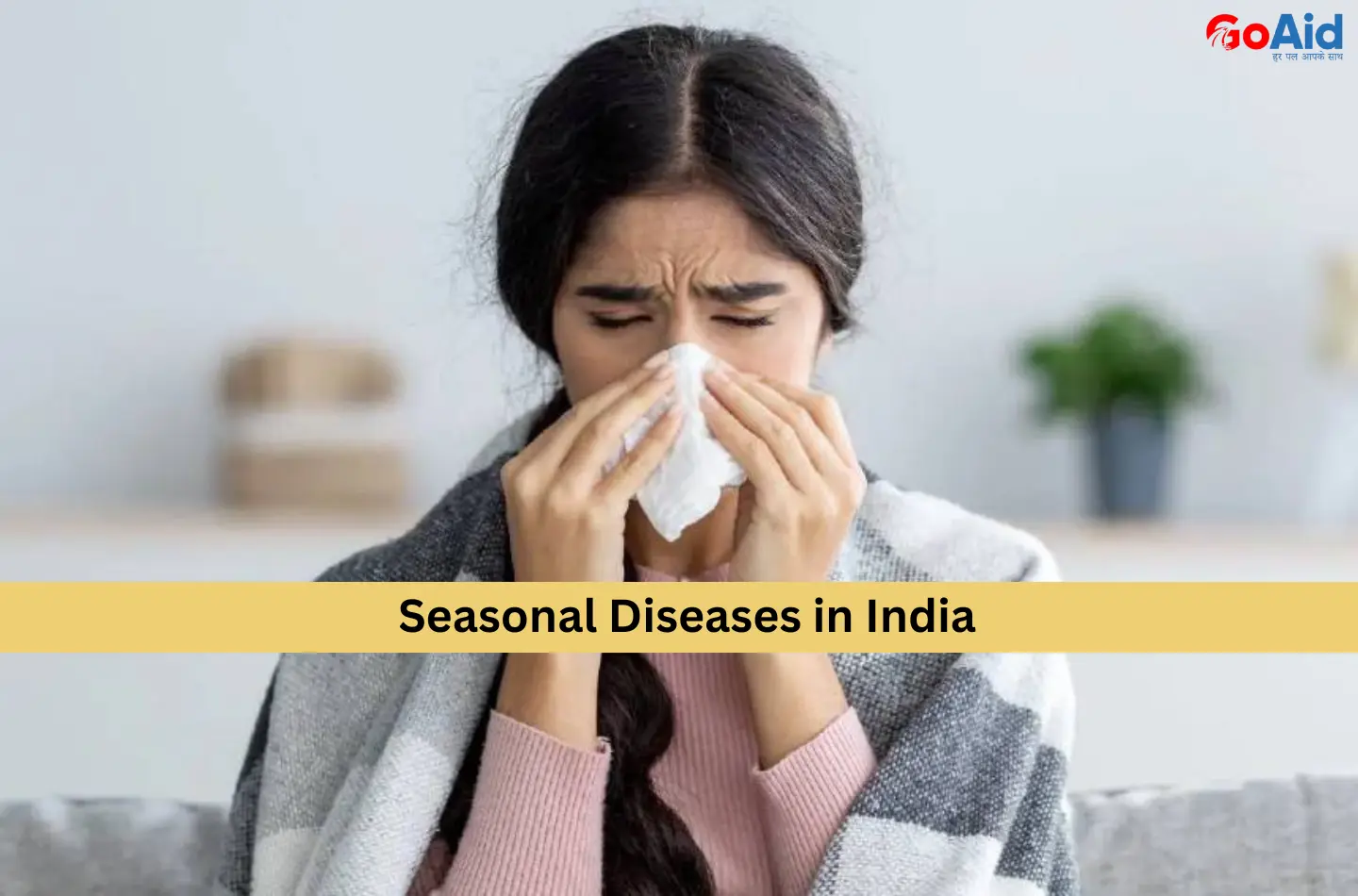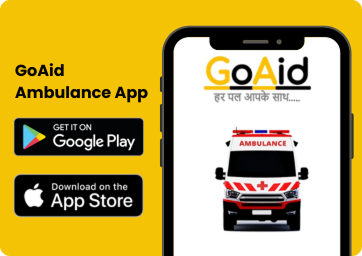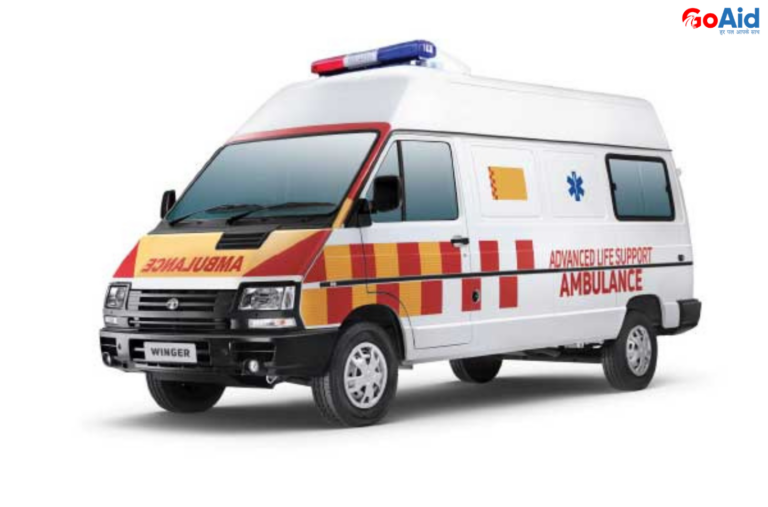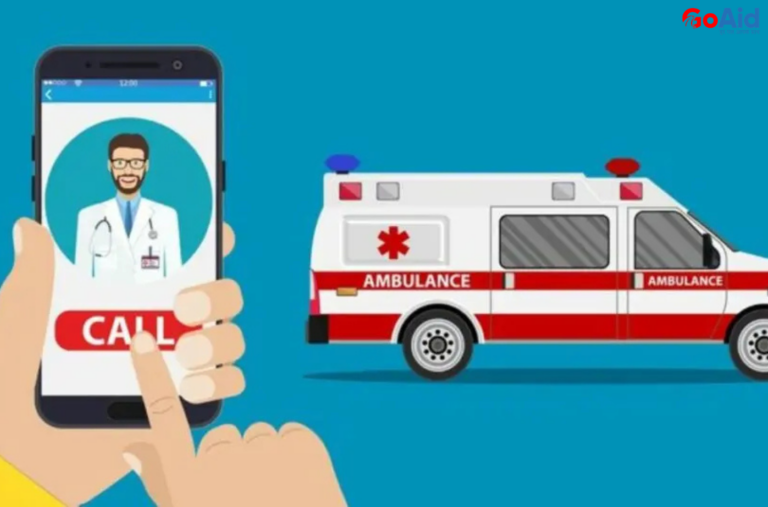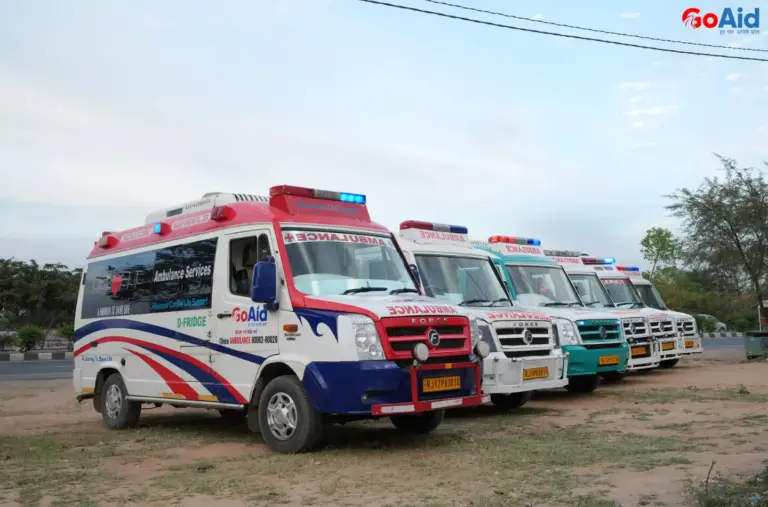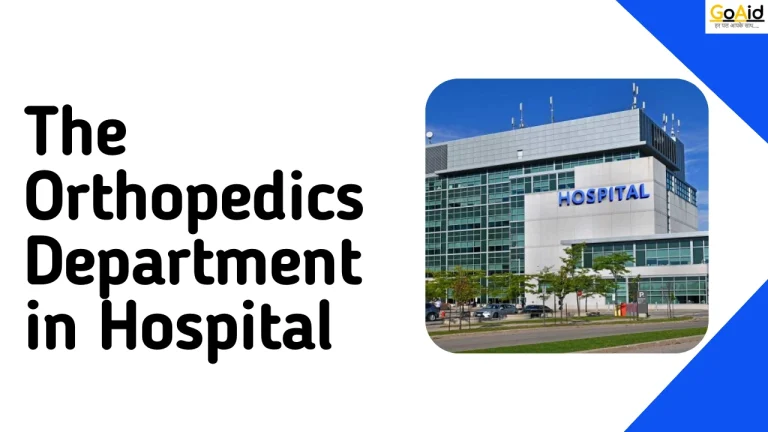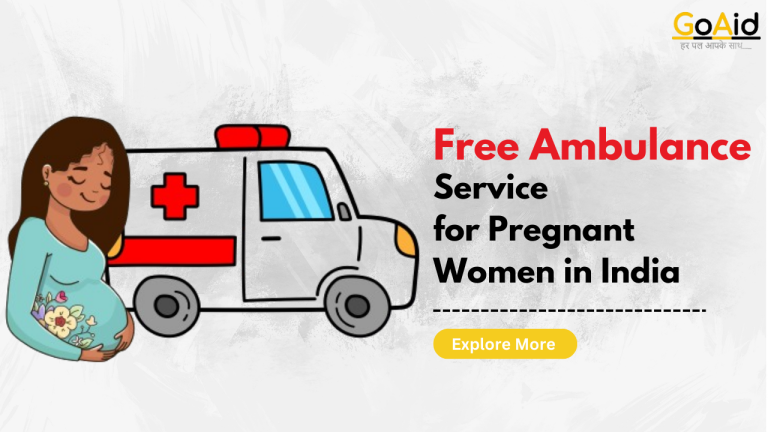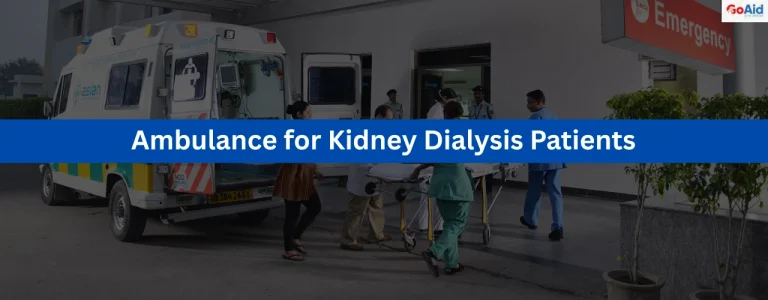With changing weather conditions, India often faces a surge in seasonal diseases such as dengue, malaria, viral fever, and influenza. These illnesses can spread rapidly and sometimes become life-threatening if not treated on time.
During such health outbreaks, quick access to medical help becomes crucial, especially for patients showing severe symptoms like high fever, dehydration, or breathing difficulty. ThatŌĆÖs where GoAidŌĆÖs 24×7 ambulance services come into play. This ensures that patients get immediate transportation to hospitals, regardless of the time or location.
This is why, in this blog, we have provided you all the details about the most common seasonal diseases, the role of ambulance services during outbreaks, GoAidŌĆÖs emergency support system, and tips to stay protected during seasonal changes. Are you willing to know about all these points in detail? Then read this blog to the end.
So, letŌĆÖs start ŌĆō
What Are the Most Common Seasonal Illnesses?
Seasonal changes in India often bring specific illnesses that affect a large population. Awareness of these diseases helps in early recognition and prompt treatment. Here are the most common seasonal illnesses:
- Common Cold
A viral infection that increases during winter. This causes runny nose, sneezing, sore throat, and mild fever. Early care and hydration prevent complications and reduce the spread of infection.
- Influenza (Flu)
Flu is more prevalent during monsoon and winter. This leads to high fever, body aches, fatigue, and respiratory symptoms. Prompt medical attention prevents severe complications like pneumonia.
- Dengue Fever
Transmitted by mosquitoes during rainy seasons, dengue causes high fever, joint pain, and rashes. Rapid diagnosis and supportive care, sometimes requiring hospital transfer, are essential.
- Malaria
Another mosquito-borne illness common in monsoon, malaria causes fever, chills, sweating, and fatigue. Immediate medical care is crucial to avoid severe complications.
- Chikungunya
Spread during rainy months, chikungunya triggers joint pain, fever, and headaches. Ambulance support can help transport patients to hospitals for symptomatic treatment and hydration.
- Typhoid
Seasonal food and water contamination can lead to typhoid. This causes prolonged fever, weakness, and gastrointestinal issues. Timely hospitalization and medical transport are vital for recovery.
- Viral Gastroenteritis
Also called stomach flu, it peaks during summer and monsoon. This causes diarrhea, vomiting, and dehydration. Ambulance services can provide rapid transfer for severe dehydration cases.
- Heatstroke
During summer, extreme temperatures can lead to heat exhaustion or heatstroke, with dizziness, nausea, and confusion. Immediate cooling and emergency medical support can save lives.
- Allergic Rhinitis
Seasonal pollen and dust trigger sneezing, congestion, and watery eyes, particularly in spring. Severe cases may require emergency care for breathing difficulties.
- Skin Infections
Monsoon humidity often causes fungal or bacterial skin infections. This leads to rashes, itching, and irritation. Severe cases may require professional evaluation and transport via ambulance.
How Does Ambulance Services Play a Key Role During Outbreak?
During seasonal outbreaks, ambulance services like GoAid become essential in managing health emergencies efficiently. Rapid medical transport ensures that patients experiencing high fever, dehydration, or severe respiratory symptoms reach hospitals quickly.
This reduces complications and fatalities. Ambulances are equipped with oxygen, first aid, and monitoring devices to stabilize patients during transit. GoAidŌĆÖs trained paramedics provide immediate care, assess critical conditions, and guide families on emergency procedures.┬Ā
Additionally, during widespread outbreaks like dengue, malaria, or influenza, 24×7 ambulance availability helps manage high patient volumes and provides timely access to hospitals. Ambulance services also reduce the risk of delayed treatment, minimize hospital congestion, and offer safe and hygienic transport for contagious patients.
Their role extends beyond emergency response to preventive guidance, coordination with healthcare facilities, and public awareness. This makes them indispensable during seasonal health crises.
How Does GoAid Support Patients During Seasonal Health Crises?
GoAid Ambulance ensures timely, professional support for patients during seasonal outbreaks. This provides rapid transportation, immediate care, and peace of mind to affected individuals and families. Here are the key ways GoAid supports patients:
- Rapid 24×7 Emergency Response
GoAid maintains round-the-clock ambulance availability. This ensures patients experiencing fever, dehydration, or respiratory distress receive immediate medical attention without delay.
- Trained Paramedics Onboard
Experienced paramedics assess the patientŌĆÖs condition during transit, provide first aid, and stabilize critical patients. This improves survival chances before hospital arrival.
- Specialized Ambulance Fleet
GoAid offers ICU, oxygen, and ventilator-equipped ambulances to handle severe cases of dengue, malaria, influenza, or respiratory complications efficiently.
- Safe and Hygienic Transport
Ambulances are regularly sanitized and follow strict hygiene protocols. This minimizes the risk of infection transmission during transport of contagious patients.
- Guidance to Families
GoAid paramedics provide immediate advice and guidance to family members on managing symptoms safely until professional care is reached.
- Coordination with Hospitals
The service communicates with nearby hospitals in advance. This ensures patients are admitted promptly and receive appropriate treatment on arrival.
- Coverage Across Cities
GoAidŌĆÖs network covers multiple cities and regions. This ensures access to emergency support for seasonal diseases even in remote areas.
Common Symptoms That Require Immediate Medical Attention
Certain symptoms during seasonal illnesses indicate a serious condition requiring urgent care and ambulance support. Look out for the following signs:
- High fever persisting for multiple days
- Severe dehydration with dry mouth and dizziness
- Difficulty breathing or shortness of breath
- Persistent vomiting or diarrhea
- Unconsciousness or extreme lethargy
- Severe headache or neck stiffness
- Chest pain or irregular heartbeat
- Swelling or pain in joints during viral fevers
- Bleeding from gums, nose, or skin
- Rapid spread of rashes or skin irritation
Tips to Stay Safe During Seasonal Changes
Seasonal changes bring varying health risks. Awareness and preventive measures can protect you and your family. Here are 10 practical tips to stay safe:
- Maintain Proper Hygiene
Regular handwashing, sanitization, and cleanliness reduce exposure to germs, bacteria, and viruses during seasonal transitions.
- Stay Hydrated
Adequate water intake helps prevent dehydration, supports immune function, and assists in flushing out toxins from the body.
- Eat a Balanced Diet
Consuming fruits, vegetables, and nutrient-rich foods strengthens immunity. This helps the body fight seasonal illnesses effectively.
- Use Protective Clothing
Wear appropriate clothing to guard against extreme cold, heat, or mosquito bites. This reduces the risk of infection and seasonal discomfort.
- Avoid Stagnant Water
During monsoon, prevent mosquito breeding by draining stagnant water. This reduces the risk of dengue, malaria, and other vector-borne diseases.
- Take Vaccinations
Seasonal flu shots, dengue awareness vaccines, or other recommended immunizations provide preventive protection against specific seasonal illnesses.
- Practice Safe Food Habits
Eat freshly prepared meals, avoid street food during rainy or hot seasons, and ensure safe drinking water to prevent gastrointestinal infections.
- Regular Exercise
Moderate physical activity improves immunity, circulation, and overall health. This makes the body more resilient against seasonal diseases.
- Monitor Symptoms Early
Be alert to early signs like fever, rashes, or cough, and seek medical attention promptly to prevent complications.
- Use GoAid Emergency Services
In severe or sudden illness, contact GoAid Ambulance for rapid 24×7 medical transport. This ensures timely care during outbreaks or critical seasonal health events.
Benefits of Hiring GoAid for Seasonal Diseases
Hiring GoAid Ambulance during seasonal outbreaks provides fast, reliable, and professional medical support. This ensures patients receive timely care while minimizing complications. Here are the key benefits:
- Rapid Emergency Response
GoAid guarantees quick ambulance arrival, often within 10 minutes. This ensures patients experiencing fever, dehydration, or respiratory distress get immediate medical attention.
- Trained Paramedics Onboard
All ambulances are staffed with skilled paramedics who provide first aid, monitor vitals, and stabilize patients during transit. This increases survival chances.
- Advanced Medical Equipment
GoAid ambulances are equipped with oxygen, ventilators, cardiac monitors, and other life-saving devices suitable for severe seasonal illnesses.
- 24×7 Availability
Services operate round-the-clock, 365 days a year. This ensures that medical emergencies are addressed promptly, regardless of time or location.
- Safe and Hygienic Transport
Ambulances follow strict sanitation and hygiene protocols. This minimizes the risk of infection transmission during transport, especially for contagious diseases like dengue or influenza.
- Wide Coverage Across Cities
GoAidŌĆÖs network spans multiple regions. This enables emergency support even in remote areas affected by seasonal outbreaks.
- Coordination with Hospitals
GoAid communicates with hospitals ahead of arrival. This ensures patients are admitted quickly and receive proper treatment immediately.
- Specialized Ambulance Fleet
From ICU and oxygen-equipped vehicles to ventilator ambulances, GoAid provides the right ambulance type based on the patientŌĆÖs condition.
- Guidance to Families
Paramedics offer instructions and support to family members during transit. This helps manage symptoms and reduce anxiety until professional care is reached.
- Affordable and Transparent Rates
GoAid provides government-approved, cost-effective ambulance services. This makes professional emergency care accessible without financial stress.
Conclusion
In conclusion, we have provided you all the details about the most common seasonal diseases in India, the critical role of ambulance services like GoAid, and preventive measures to stay healthy. GoAid ensures rapid 24×7 emergency support, professional paramedic care, and safe patient transport during outbreaks. This makes it a trusted partner for families across India in managing seasonal health crises effectively.

